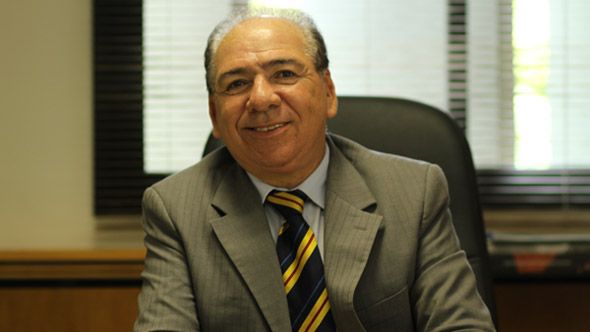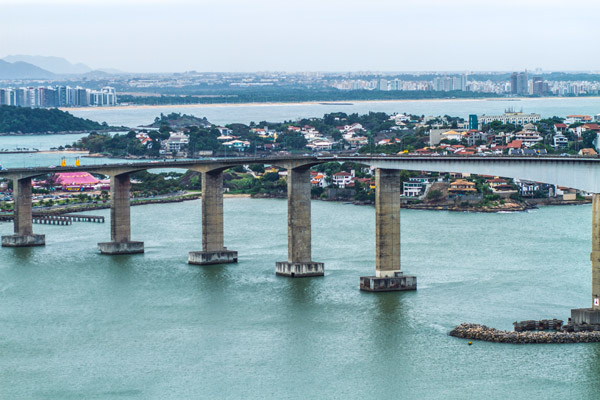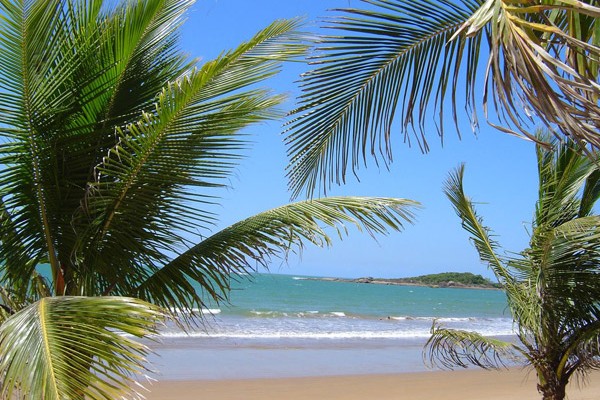Espirito Santo: Emerging Tourism Destination
The President of Espírito Santo Convention & Visitors Bureau talks about the tourism industry in Espírito Santo. He also mentions some interesting investment opportunities, not only in the field of tourism, but in many different sectors of the economy.
Interview with Maely Coelho, Executive President of Espírito Santo Convention & Visitors Bureau

I would like to talk about Espírito Santo in general and for you to give us a general image about the tourism sector in the State. Which are the challenges in terms of tourism?
In the tourism field there is the opportunity to build resorts (there are none here), and in terms of hotel network we have major opportunities too.
Espírito Santo is a state that is a synthesis of Brazil. Here in the state we have everything that the rest of Brazil has and many things that the rest of Brazil doesn’t have and never will have. Let’s picture the mountains of the south: we have here the same mountains 40 minutes away from the beach, which is important, with a quiet and wonderful vocation to produce movement of tourism, so much that we are the agrotourism capital of the country.
There is a mixture of races: 62% of all Espírito Santo inhabitants are of Italian origin, 26% are of German origin, and then there are the Swiss, Japanese, Greek, Lebanese. The Lebanese, Greek and Polish columns have large colonies here that are preserved until today. Only in the state of Espírito Santo are there Pomeranians: Pomerania was near Germany, and it doesn’t exist anymore; the whole culture of the Pomeranians who came here at the time still exists. The language and costumes remain. So this is a rich state.
When you talk about summer in Brazil, you think about the Northeast, where there are beaches, warm water, the sand dunes. Here we have an ability to be infinitely better than the Northeast itself, although we are in the Southeast, because here we have our dunes and the dunes are different, similar to the ones in Natal, but our dunes covered a village that, until today, only the tower of the church is visible.
Here we have the Forró, a culture that is very focused on the Northeast. The only city that keeps the flame of the Forró festival is one in upstate Espírito Santo. No city in the Northeast, which is the birthplace of Forró, has what we have here.
We have some municipalities like Pinheiros, Montanha, Mucurici, Ponto Belo, which are great producers of certified smoked meat.
Thus, we have everything that Brazil has and a bit more. If we wanted to be a country, we could be because it is the second largest oil producer, it’s the second largest gas producer, we have one of the largest cellulose companies in the world, we are the largest producer of soluble and conilon coffee and we are the second largest producer of Arabica coffee in Brazil. The north of the state provides Brazil with much of its fruit: the papaya you eat in Paris, the papaya you eat in Portugal, they are all from upstate Espírito Santo. So, we are rich in terms of our economy.
In tourism we have big advantages regarding the rest of Brazil, because the same distance you walk from here to Rio Grande do Sul, is the same you have to travel to Fortaleza, Ceará, i.e., we are in the center. Geographically we are in a very privileged position. We are one hour and twenty minute away from São Paulo, Salvador and Brasília, we are 40 minutes away from Rio de Janeiro and Belo Horizonte. Let’s imagine that in a country with continental dimensions like Brazil we travel from Fortaleza to Porto Alegre: it’s almost the same distance as the one from São Paulo to Paris. Here we are in the center and it makes us have a good positioning in tourism, leisure tourism, business tourism and events tourism. The vocation of the state is tourism. Also in nautical terms, we have the largest marlin fishing competition on the planet and we also have nautical tourism. We have nautical competitions. We have religious tourism: we have here the “Way of Padre Anchieta,” for which people come from Brazil and all over the World. We have a range of attractions which are very privileged.
Everything’s almost perfect and Espírito Santo is in the center of Brazil. Which are the challenges?
62% of our tourists are coming by road and our roads are poor. We need to have a convention center. We need a better airport: what we did here in Brazil is called “puxadinho” but that does not solve the problem, because it does not include the demand of flights and our needs. It should have opened in 2007 and we are in 2012. It has somewhat improved, major problems with restrictions to very large aircraft. We have cargo flights between the United States and Vitória that travel half full due to lack of space, because at the time of landing and takeoff the runway is not compatible. We do not have a terminal, but it’s now being planned.

If you think about roads, airport and convention center (which is vital) – we have here a ceremonial place but it’s far from being a convention center – but now the convention center is up for public bidding and in 2013 the new airport will open. With all that we’ll give a lot of headaches to the rest of Brazil in terms of events tourism.
From 2013 forward it will be different?
Yes, from 2013 forward.
And what about the conventions center?
In 2014 the conventions center will be ready.
And the roads?
The BR 101 duplication will be starting in 60 days. Next week the contract with the winning company will be signed.
Until next year, how can Espírito Santo be competitive in terms of events?
We have done events here with 17 000 participants (religious event). We deal very well with events with up to 5000 participants. But we also have to develop the issue of the hotel network, because having a convention center is not enough: you need a hotel network. It’s also of no use to have a hotel network and not have a convention center or not have an airport that supports the demand. Our hotel network is growing well, having recently opened hotels. We have 12 800 beds in Vitória and in 2014 it will grow to 16 000. So we can now go after major events.
In terms of prospects for tourism in the next two years, what do you think will happen in terms of growth?
The tourism business is well stabilized. Within that period we will have a growth of 12 to 13%. Last year leisure tourism grew 84%. This current government is also focused on the development of leisure tourism: they are going out of the country to events, to publicize our state, to consolidate the capacity we have for leisure tourism.
Business tourism is going very well. Last year we hosted 102 events. If we think that the year has 52 weeks, we hosted almost two events per week and many countries do not have that volume. In terms of revenue we surpassed 54 million dollars last year, in terms of visitors, we reached almost 30 000. Despite the difficulties we have in terms of airport, convention center and hotel network, we are doing very well.
In terms of leisure tourism, the state needs to communicate more. They need to promote us out there. And they are doing just that. They just started to promote us and last year we already had a 84% increase. The per capita tourist business is always three times larger than the leisure tourist. We ended the year with $ 194 per capita, Embratur closed last year with $ 240 and we are talking about São Paulo and Rio de Janeiro with more national and international events and higher costs of living. Then we had a very good result in per capita, participants and revenue.
The former Government was the one that created the first Tourism State Office. That was 4 or 5 years ago. It created the office but spent very little. This Government has now raised eight times the amount invested in the promotion of our state. We now have a prediction that leisure tourism will grow more than last year’s 84%. There is high hope that tourism will grow.
I would like to talk a little bit about the Espírito Santo Convention & Visitors Bureau. Could you present the Foundation, presenting its history?
In the last century the idea of Convention was born in Detroit, 25 years later it and came to Brazil and 15 years ago it arrived to Espírito Santo. In these 15 years of the Espírito Santo Convention existence we attracted more than 700 events to the State. We had an income that exceeded the limit of half a billion dollars. We brought the idea that the Convention represents a very important role in attracting business and events tourism.

Here in Brazil we are a foundation that is an institution that stands between the public and the private sector. We have circa 10 to12 very capable employees that draw events to the State. We have had some advantage over other states in attracting events due to the training of our personnel and our geographic strategy, although we lack comfort in the area of infrastructure, namely roads, airport and the convention center that is coming.
Which aspects of tourism would you like to promote and in what type of market would you like to focus on?
The market in which we must focus on is the same: leisure, business, events, nautical and religious. We also have here a great amount of adventure tourism, but what we lack is exactly promotion: we have international competitions of free flight and others, due to the location and due to the wind, we also have international fishing competitions at sea. If we have a little more promotion, which is what the current government is doing, within a very short time, we will be one of the most promising in this field.
Brazil is living a unique moment at international level and we must profit from that fact. We will have a fantastic international media exposure in the next three years. In 2013 we will have de Confederations Cup, in 2014 we will host the World Cup, and in 2016 we will host the Olympics: three international events that are going to globalize this information and we will have a spontaneous exposure in the media and will be able to show who Brazil is. We are working closely with the Government to bring some football teams to Espírito Santo to make their pre-season and the favorites are France, Italy, Germany, Argentina and Portugal. We are asking for three teams to see if we can get one, but I think we can have two. For us this is a gateway to promote our state, at least in terms of Europe, because when we talk about the French team, the rest of Europe also wants to know about it. With these events, we’ll have a major opportunity to show our country but also our state to the whole world.
What is the importance of the meetings, incentives, conferences and exhibitions sector in Espírito Santo?
It’s very important, because when we attract that niche of people, we are drawing with a purpose, but it can be a gateway for them to become, later, leisure tourists. Our city is a beautiful city, our state is very beautiful. We will nurture the development and growth of our activities.
Going back to the Convention Bureau, the main goal is to increase the flow of tourists through projects that are meant to attract national and international events. Are there partnerships with some international tourism institutions, or are you looking for some?
Until last year with the last Government, all events in Brazil that took place outside the country were made by the Convention, the Convention of the Federation. It left the Ministry of Tourism, came to Embratur that passed it to the Covenants Confederation that would always make the events outside Brazil. Since there were some slips of the ministries, the current government stopped a little, but we still continue with very strong partnerships with other institutions for business tourism events, such as ABIH the Brazilian Association of hotel network in Brazil, ABAV the Brazilian agency for travel agencies. There is a conglomerate of interests and institutions aimed at further unite forces with only one purpose: to attract tourists, to sell our destination.
The Municipal Government is an interesting partner and the State Government is also an interesting partner, we have permanent agreements with local governments and with the State Government. We can create a recipe where you have these partners: municipal, state and institutions. When possible we also make international conventions with other institutions which are all recognized and credible to make temporary or more permanent partnerships with them, for example, the Ministry of Tourism, Embratur which is a Government institution, and so on.
Which would be your message to our readers and international investors? What opportunities can you see in the tourism sector for international investors?
In Brazil there is no other state – and Brazil is a window of opportunities in all areas and for all investments – as Espírito Santo. We have agribusiness which is great for investment, we have large industrial plants, and many new industries are born focused on engineering, on agribusiness, mining-oriented, focused on oil and on shipyards. The Chinese are coming here with Jurong which will build one of the biggest shipyards here. We have a complex of harbors that don’t exist in the rest of Brazil; we have the only harbor capable of anchoring the largest ship to be built that will travel between Japan and Vitória. It is also possible to build a bigger port. We have infinite opportunities.
In the tourism field there is the opportunity to build resorts (there are none here), and in terms of hotel network we have major opportunities too.
There are lots of opportunities for investment in every field. It’s not possible to enumerate them, because opportunities exist in all segments. And the logistic is very interesting: we have that fantastic harbor network, but we also have railways that are the most exquisite and the most profitable in Brazil.